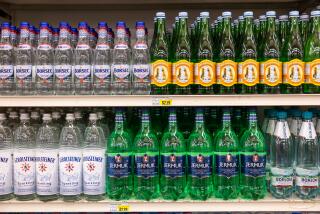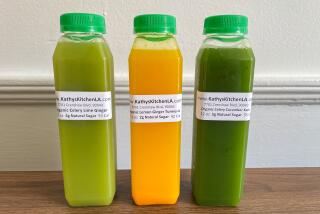Apple Processors Trying to Shine Up Their Profits
- Share via
YAKIMA, Wash. — That golden glow in your glass of apple juice isn’t looking so rich these days.
Flat sales and high costs have some of the nation’s largest processors searching for new ways to squeeze cash out of culls. Much of the activity is in central Washington, which grows more than half of the nation’s apples.
Some companies are experimenting with “natural” apple juices that cost more. Others are diversifying into dried and frozen apple products or pushing for more exports.
Seneca and Tree Top, the nation’s apple juice leaders along with Mott’s, are launching high-end juices aimed at adults.
Seneca bills its Orchard Tap “the first apple juice that looks, smells and tastes like fresh apples.”
The translucent white juice, made at the company’s Prosser, Wash., plant, is being test-marketed in Washington state at a cost of around $2.99 per half-gallon. That’s about $1 more than a bottle of regular juice.
Tree Top, based in Selah, Wash., last year began test marketing Fiber Rich, a similar product.
“Both Seneca and Tree Top are forward-looking organizations that are saying there are lots of ways to press apple juice,” said Shelley Page, business manager for Pittsford, N.Y.-based Seneca Foods Corp.
They’re also responding to new federal laws.
The U.S. Food and Drug Administration will soon require fiber content listed on the labels of apple juice, and no one wants to post a big zero there, said Larry Davenport of the Processed Apple Institute in Atlanta.
Mott’s, the nation’s best-selling brand of apple juice, is not introducing a new type, said Beth Ostendarp, spokeswoman for Cadbury Beverages, the Stamford, Conn.-based parent. But the company for years has sold a murky apple juice billed as 100% pure.
Originally most apple juice was simply pressed apple cider, which was dark-colored and pungent. That was replaced about 50 years ago by the highly processed, clear, golden juice that is still the most popular, Page said.
Most apple juice is consumed by children. Adults often find it too sweet or too bland and prefer citrus juices, Page said.
Orchard Tap is sold in the refrigerated section of the store and has a limited shelf life. It has more fiber and is designed to appeal to the health conscious, she said.
Davenport said growth in apple juice sales has been slow for the past three years, in part because record prices for raw material have driven up juice prices.
Some industry officials estimate that the apple juice market may have slumped 20% to 30% since January because of rising prices.
Higher production costs reflect a reduction in the supply of concentrate from Europe and the southern hemisphere.
More to Read
Inside the business of entertainment
The Wide Shot brings you news, analysis and insights on everything from streaming wars to production — and what it all means for the future.
You may occasionally receive promotional content from the Los Angeles Times.









